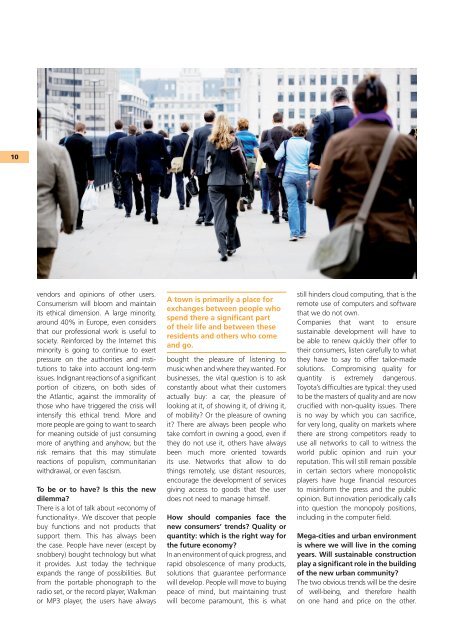SD Vision - Halyps Cement
SD Vision - Halyps Cement
SD Vision - Halyps Cement
Create successful ePaper yourself
Turn your PDF publications into a flip-book with our unique Google optimized e-Paper software.
10<br />
vendors and opinions of other users.<br />
Consumerism will bloom and maintain<br />
its ethical dimension. A large minority,<br />
around 40% in Europe, even considers<br />
that our professional work is useful to<br />
society. Reinforced by the Internet this<br />
minority is going to continue to exert<br />
pressure on the authorities and institutions<br />
to take into account long-term<br />
issues. Indignant reactions of a signifi cant<br />
portion of citizens, on both sides of<br />
the Atlantic, against the immorality of<br />
those who have triggered the crisis will<br />
intensify this ethical trend. More and<br />
more people are going to want to search<br />
for meaning outside of just consuming<br />
more of anything and anyhow, but the<br />
risk remains that this may stimulate<br />
reactions of populism, communitarian<br />
withdrawal, or even fascism.<br />
To be or to have? Is this the new<br />
dilemma?<br />
There is a lot of talk about «economy of<br />
functionality». We discover that people<br />
buy functions and not products that<br />
support them. This has always been<br />
the case. People have never (except by<br />
snobbery) bought technology but what<br />
it provides. Just today the technique<br />
expands the range of possibilities. But<br />
from the portable phonograph to the<br />
radio set, or the record player, Walkman<br />
or MP3 player, the users have always<br />
A town is primarily a place for<br />
exchanges between people who<br />
spend there a signifi cant part<br />
of their life and between these<br />
residents and others who come<br />
and go.<br />
bought the pleasure of listening to<br />
music when and where they wanted. For<br />
businesses, the vital question is to ask<br />
constantly about what their customers<br />
actually buy: a car, the pleasure of<br />
looking at it, of showing it, of driving it,<br />
of mobility? Or the pleasure of owning<br />
it? There are always been people who<br />
take comfort in owning a good, even if<br />
they do not use it, others have always<br />
been much more oriented towards<br />
its use. Networks that allow to do<br />
things remotely, use distant resources,<br />
encourage the development of services<br />
giving access to goods that the user<br />
does not need to manage himself.<br />
How should companies face the<br />
new consumers’ trends? Quality or<br />
quantity: which is the right way for<br />
the future economy?<br />
In an environment of quick progress, and<br />
rapid obsolescence of many products,<br />
solutions that guarantee performance<br />
will develop. People will move to buying<br />
peace of mind, but maintaining trust<br />
will become paramount, this is what<br />
still hinders cloud computing, that is the<br />
remote use of computers and software<br />
that we do not own.<br />
Companies that want to ensure<br />
sustainable development will have to<br />
be able to renew quickly their offer to<br />
their consumers, listen carefully to what<br />
they have to say to offer tailor-made<br />
solutions. Compromising quality for<br />
quantity is extremely dangerous.<br />
Toyota’s diffi culties are typical: they used<br />
to be the masters of quality and are now<br />
crucifi ed with non-quality issues. There<br />
is no way by which you can sacrifi ce,<br />
for very long, quality on markets where<br />
there are strong competitors ready to<br />
use all networks to call to witness the<br />
world public opinion and ruin your<br />
reputation. This will still remain possible<br />
in certain sectors where monopolistic<br />
players have huge fi nancial resources<br />
to misinform the press and the public<br />
opinion. But innovation periodically calls<br />
into question the monopoly positions,<br />
including in the computer fi eld.<br />
Mega-cities and urban environment<br />
is where we will live in the coming<br />
years. Will sustainable construction<br />
play a signifi cant role in the building<br />
of the new urban community?<br />
The two obvious trends will be the desire<br />
of well-being, and therefore health<br />
on one hand and price on the other.


